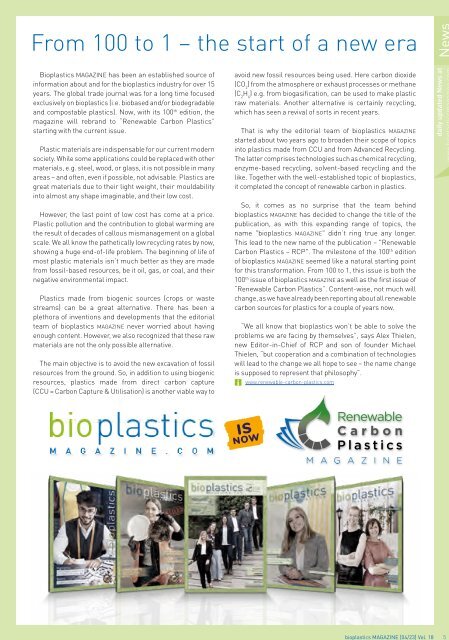Issue 04/2023
Highlights 100th issue Rebranding
Highlights
100th issue
Rebranding
Create successful ePaper yourself
Turn your PDF publications into a flip-book with our unique Google optimized e-Paper software.
ioplastics MAGAZINE [<strong>04</strong>/23] Vol. 18<br />
5<br />
From 100 to 1 – the start of a new era<br />
Bioplastics MAGAZINE has been an established source of<br />
information about and for the bioplastics industry for over 15<br />
years. The global trade journal was for a long time focused<br />
exclusively on bioplastics (i.e. biobased and/or biodegradable<br />
and compostable plastics). Now, with its 100 th edition, the<br />
magazine will rebrand to “Renewable Carbon Plastics”<br />
starting with the current issue.<br />
Plastic materials are indispensable for our current modern<br />
society. While some applications could be replaced with other<br />
materials, e.g. steel, wood, or glass, it is not possible in many<br />
areas – and often, even if possible, not advisable. Plastics are<br />
great materials due to their light weight, their mouldability<br />
into almost any shape imaginable, and their low cost.<br />
However, the last point of low cost has come at a price.<br />
Plastic pollution and the contribution to global warming are<br />
the result of decades of callous mismanagement on a global<br />
scale. We all know the pathetically low recycling rates by now,<br />
showing a huge end-of-life problem. The beginning of life of<br />
most plastic materials isn’t much better as they are made<br />
from fossil-based resources, be it oil, gas, or coal, and their<br />
negative environmental impact.<br />
Plastics made from biogenic sources (crops or waste<br />
streams) can be a great alternative. There has been a<br />
plethora of inventions and developments that the editorial<br />
team of bioplastics MAGAZINE never worried about having<br />
enough content. However, we also recognized that these raw<br />
materials are not the only possible alternative.<br />
The main objective is to avoid the new excavation of fossil<br />
resources from the ground. So, in addition to using biogenic<br />
resources, plastics made from direct carbon capture<br />
(CCU = Carbon Capture & Utilisation) is another viable way to<br />
avoid new fossil resources being used. Here carbon dioxide<br />
(CO 2<br />
) from the atmosphere or exhaust processes or methane<br />
(C 2<br />
H 4<br />
) e.g. from biogasification, can be used to make plastic<br />
raw materials. Another alternative is certainly recycling,<br />
which has seen a revival of sorts in recent years.<br />
That is why the editorial team of bioplastics MAGAZINE<br />
started about two years ago to broaden their scope of topics<br />
into plastics made from CCU and from Advanced Recycling.<br />
The latter comprises technologies such as chemical recycling,<br />
enzyme-based recycling, solvent-based recycling and the<br />
like. Together with the well-established topic of bioplastics,<br />
it completed the concept of renewable carbon in plastics.<br />
So, it comes as no surprise that the team behind<br />
bioplastics MAGAZINE has decided to change the title of the<br />
publication, as with this expanding range of topics, the<br />
name "bioplastics MAGAZINE" didn’t ring true any longer.<br />
This lead to the new name of the publication – "Renewable<br />
Carbon Plastics – RCP". The milestone of the 100 th edition<br />
of bioplastics MAGAZINE seemed like a natural starting point<br />
for this transformation. From 100 to 1, this issue is both the<br />
100 th issue of bioplastics MAGAZINE as well as the first issue of<br />
“Renewable Carbon Plastics”. Content-wise, not much will<br />
change, as we have already been reporting about all renewable<br />
carbon sources for plastics for a couple of years now.<br />
“We all know that bioplastics won’t be able to solve the<br />
problems we are facing by themselves”, says Alex Thielen,<br />
new Editor-in-Chief of RCP and son of founder Michael<br />
Thielen, “but cooperation and a combination of technologies<br />
will lead to the change we all hope to see – the name change<br />
is supposed to represent that philosophy”.<br />
www.renewable-carbon-plastics.com<br />
daily updated News at

















